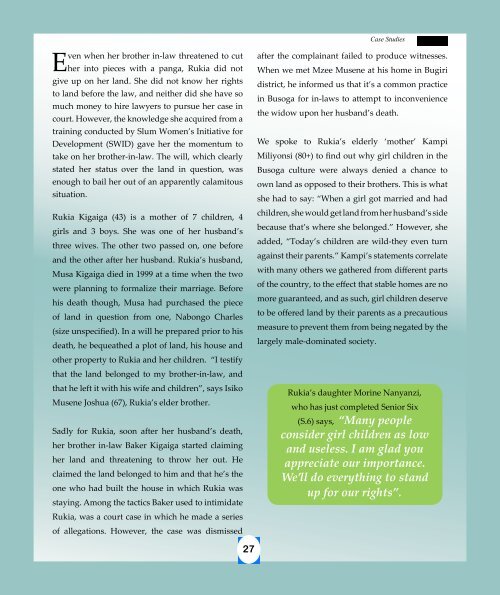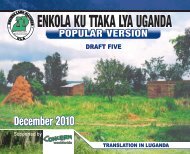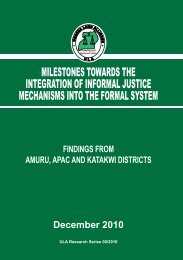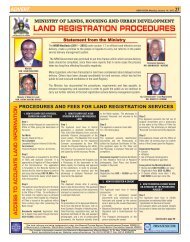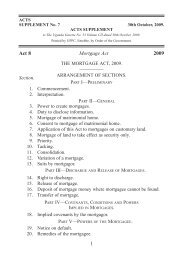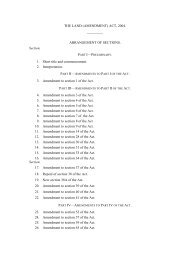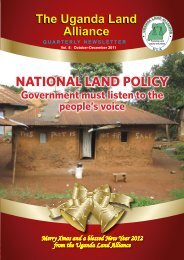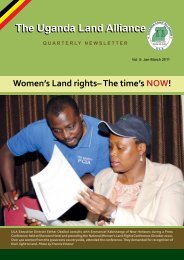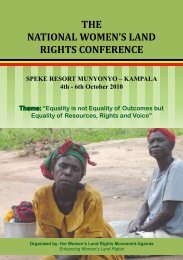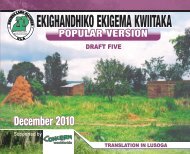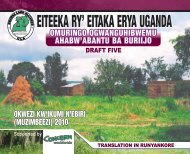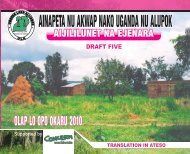A Woman & her Land - Uganda Land Alliance
A Woman & her Land - Uganda Land Alliance
A Woman & her Land - Uganda Land Alliance
- No tags were found...
Create successful ePaper yourself
Turn your PDF publications into a flip-book with our unique Google optimized e-Paper software.
Even when <strong>her</strong> brot<strong>her</strong> in-law threatened to cut<strong>her</strong> into pieces with a panga, Rukia did notgive up on <strong>her</strong> land. She did not know <strong>her</strong> rightsto land before the law, and neit<strong>her</strong> did she have somuch money to hire lawyers to pursue <strong>her</strong> case incourt. However, the knowledge she acquired from atraining conducted by Slum Women’s Initiative forDevelopment (SWID) gave <strong>her</strong> the momentum totake on <strong>her</strong> brot<strong>her</strong>-in-law. The will, which clearlystated <strong>her</strong> status over the land in question, wasenough to bail <strong>her</strong> out of an apparently calamitoussituation.Rukia Kigaiga (43) is a mot<strong>her</strong> of 7 children, 4girls and 3 boys. She was one of <strong>her</strong> husband’sthree wives. The ot<strong>her</strong> two passed on, one beforeand the ot<strong>her</strong> after <strong>her</strong> husband. Rukia’s husband,Musa Kigaiga died in 1999 at a time when the twowere planning to formalize their marriage. Beforehis death though, Musa had purchased the pieceof land in question from one, Nabongo Charles(size unspecified). In a will he prepared prior to hisdeath, he bequeathed a plot of land, his house andot<strong>her</strong> property to Rukia and <strong>her</strong> children. “I testifythat the land belonged to my brot<strong>her</strong>-in-law, andthat he left it with his wife and children”, says IsikoMusene Joshua (67), Rukia’s elder brot<strong>her</strong>.Sadly for Rukia, soon after <strong>her</strong> husband’s death,<strong>her</strong> brot<strong>her</strong> in-law Baker Kigaiga started claiming<strong>her</strong> land and threatening to throw <strong>her</strong> out. Heclaimed the land belonged to him and that he’s theone who had built the house in which Rukia wasstaying. Among the tactics Baker used to intimidateRukia, was a court case in which he made a seriesof allegations. However, the case was dismissedCase Studiesafter the complainant failed to produce witnesses.When we met Mzee Musene at his home in Bugiridistrict, he informed us that it’s a common practicein Busoga for in-laws to attempt to inconveniencethe widow upon <strong>her</strong> husband’s death.We spoke to Rukia’s elderly ‘mot<strong>her</strong>’ KampiMiliyonsi (80+) to find out why girl children in theBusoga culture were always denied a chance toown land as opposed to their brot<strong>her</strong>s. This is whatshe had to say: “When a girl got married and hadchildren, she would get land from <strong>her</strong> husband’s sidebecause that’s w<strong>her</strong>e she belonged.” However, sheadded, “Today’s children are wild-they even turnagainst their parents.” Kampi’s statements correlatewith many ot<strong>her</strong>s we gat<strong>her</strong>ed from different partsof the country, to the effect that stable homes are nomore guaranteed, and as such, girl children deserveto be offered land by their parents as a precautiousmeasure to prevent them from being negated by thelargely male-dominated society.Rukia’s daughter Morine Nanyanzi,who has just completed Senior Six(S.6) says, “Many peopleconsider girl children as lowand useless. I am glad youappreciate our importance.We’ll do everything to standup for our rights”.2727


